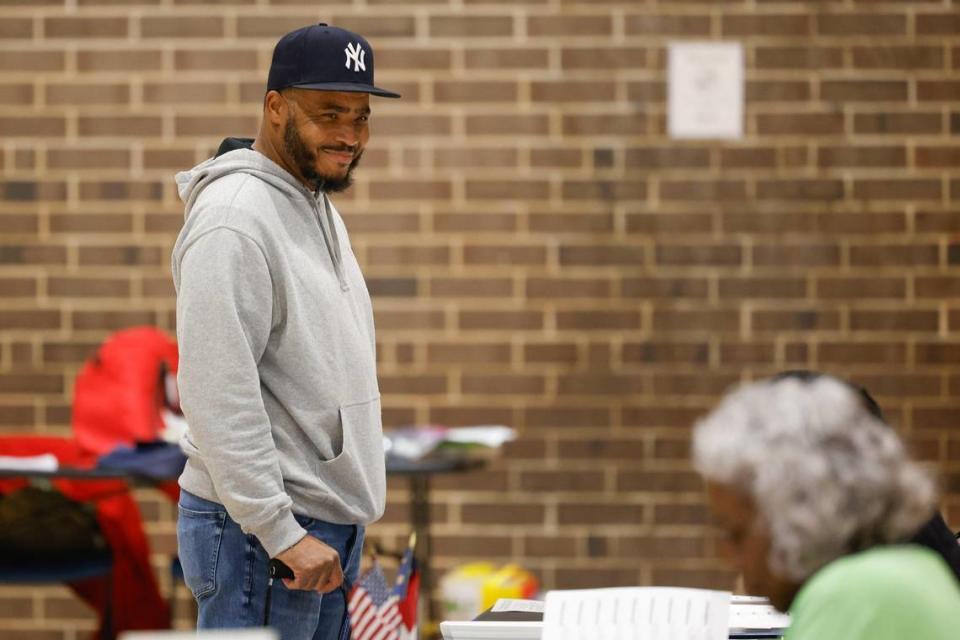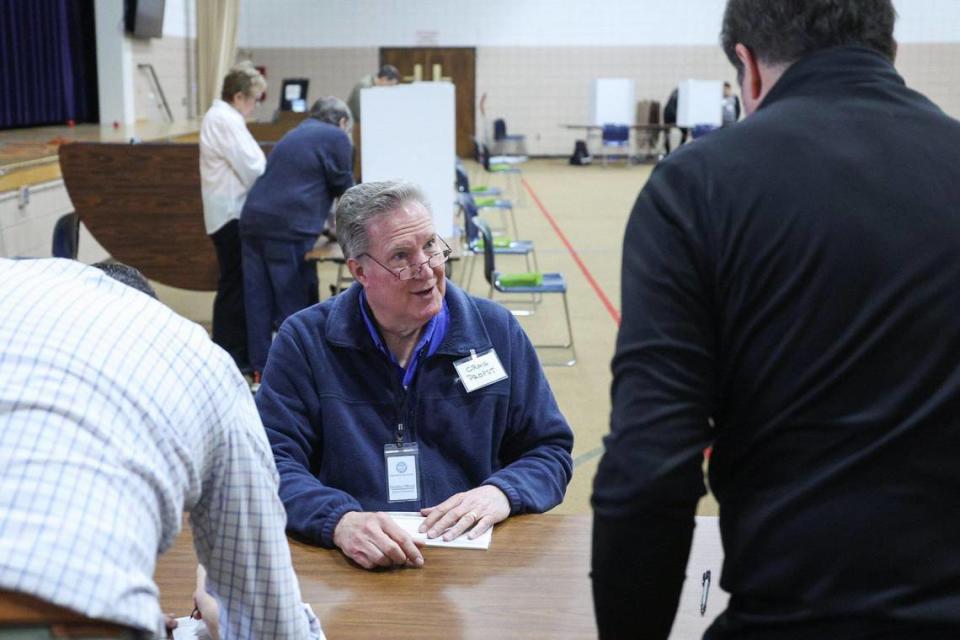‘We have the power to make change,’ so where are the primary voters in Charlotte?
- Oops!Something went wrong.Please try again later.
- Oops!Something went wrong.Please try again later.
- Oops!Something went wrong.Please try again later.
Whirling coffee steam, a box of donuts, spiraling strips of “I Voted” stickers — and no line.
At 6:41 a.m., Michael Bankhead strolled through his neighborhood’s YMCA. To his left, seven gymgoers pushed, pressed and ran. To his right, six swimmers waded in the pool.
Straight ahead, ten poll workers waited for him. When his Jumpmans and cane passed over the gym’s door frame the workers clapped and wooed as if it was his homecoming.
But they knew nothing about the 50-year-old — except for his title: Our First Voter.
On this Super Tuesday, Bankhead’s vote — combined with early votes cast Feb. 15 to Saturday — will guide top-of-the ballot presidential and gubernatorial races and determine each party’s nominees for county commission, the state legislature and Congress.
The McCrorey Family YMCA was just one of 243 voting locations in Mecklenburg County, and Bankhead was just one of about 19,000 voters who would cast their ballots across the county before 10:30 a.m.
After “everything Trump did,” Bankhead said he cared most about the presidential election. The new local names that pop up on the ballot each year are a roll of the dice, he said.
After researching, but before casting, he still talks to his mom — and his six aunts and uncles – about each year’s candidates. Democrat County Commissioner Vilma Leake has his vote, he said, because she has been consistent since her inaugural election in 2008.
“If you don’t vote, you can’t complain,” he said.

‘We have the power to make change’
A second voter trailed Bankead at 6:45 a.m. By 6:49 a.m., a third and fourth — a mother and daughter — appeared.
Teresa and Jillian Shipman, 69 and 28, have voted together in the last three elections. Since moving from Washington State and Utah, respectively, the duo — who are also roommates— have voted in Charlotte’s last three elections together.
“We have the power to make change in this state,” Jillian said. North Carolina’s status as a junior swing state only underlines the power each vote has, she said.
In 2020, former President Donald Trump won North Carolina’s race by less than three percentage points.
This year, women’s rights issues determined Teresa’s ballot — both before and after the bubbles were filled in.
In North Carolina, voters not affiliated with a party can still vote in either the Democratic or Republican primary elections, but they must choose one. Teresa, an unaffiliated, retired social worker requested the Democratic ballot.
“There’s not one Republican I can vote for,” she said.
But “civic duty” demanded she vote for someone.
It summoned Bankhead to the booths. It drew hundreds of volunteer poll workers to spend more than 12 hours ushering voters through each school, church and library turned democratic hub.
And it brought Barber-Scotia College president to Mallard Creek Presbyterian Church.
“I always vote,” Chris V. Rey said.
The issues people are voting on
This year, the economy’s effects on food and gas prices were top of mind and he filled out the top of Rey’s ballot.
“The current administration’s policies are the reason we aren’t falling off a cliff,” he said of President Joe Biden’s initiatives. “Some would say the economy was headed toward a cliff — but we never got there.”
Rey, the former Mayor of Spring Lake, which is near Fort Liberty, is also the current International President of the Phi Beta Sigma Fraternity, a fraternity founded by three African-American Howard University students in 1914. He gets his news briefs from the White House and government websites, he said, to balance the slant found in today’s media.
“Research is tough in this age,” he said. “We get squeezed in the middle of two sides, and everything is skewed to our satisfaction.”
Bipartisan support is key, he said, and it always will be.
Republicans will have to play nice for that to happen, said Kathy, a former East Mecklenburg High School teacher who voted at Philadelphia Presbyterian Church in Mint Hill. She declined to give her last name.
Naturally, she said, candidates’ stances on teacher salaries and education drove her votes. She requested a Democratic ballot at the Mint Hill church — after they tried to give her a Republican one.
But Tricia Cotham, a now-Republican who represents eastern Mecklenburg County’s District 112 in the House of Representatives, has done a good job, Kathy said. Now, she said, Cotham just has to keep it up.

The Tricia Cotham effect
Cotham recently made national headlines when she switched from the Democratic Party and gave Republicans veto-proof majorities in both legislative chambers. Her announcement came a month after the state redrew maps for the congressional and legislative districts.
The new state House map places Cotham’s Mint Hill residence in a new district where Republicans have a slight advantage and where a Democratic tie would have laid out “an extremely tough path for reelection,” the Associated Press reported.
The race for Attorney General captured one mom’s attention more than Cotham.
Gabe, a 42-year-old who also declined to give her last name, took her 2-year-old daughter to walk through the streamers and banners set up at Philadelphia Presbyterian Church. Gabe left feeling good about filing a vote for Jeff Jackson – someone she says is an honest candidate with integrity. Her daughter came away feeling good about the sticker on her hand.
“I voted!” she said as they walked to Gabe’s car.
“I know you did, wasn’t that so cool?” Gabe responded.
Jackson also pulled support from Steve Wilson, a 42-year-old who makes “just enough money” to sit comfortably between the two parties’ platforms.
He doesn’t need food stamps, but he doesn’t care about inheritance tax, he said.
He’s pro-choice and anti-war spending, he said, and at the end of the day he votes in a way that will help those who are less fortunate than him.

Early voting results in Mecklenburg County
Tuesday’s tallies will be added to early voters’ 52,551 ballots and 855 mail-in ballots.
According to Mecklenburg County data, those numbers trailed the last presidential primary by 25% — when about 71,000 Mecklenburg residents cast early ballots in 2020.
This year, only about 7% of eligible Mecklenburg voters cast ballots before Election Day Tuesday.
In 2020, Joe Biden, Bernie Sanders, Elizabeth Warren and Michael Bloomberg competed in the Democratic primary. This year, in largely Democratic Mecklenburg County, the bolded “No preference” option resting below Biden’s name could have squashed voter motivation to show up at the polls.
This year, more Republicans are voting. Nearly 20,600 Mecklenburg voters cast early ballots while Nikki Haley continues to try to unseat former President Trump — and State Treasurer Dale Folwell and Salisbury attorney Bill Graham try to stop Lt. Gov. Mark Robinson from becoming governor.
In 2020, 12,841 Republicans showed up at polls.

